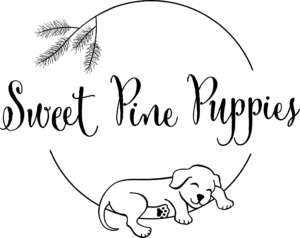Congratulations, your puppy is coming home! As of right now, they depend on you for everything – food, water, exercise, training, good health and hygiene!
Here are a few tips to get you started. Please remember that all puppies are different, and you should consult your veterinarian and trainer for any specific needs of your pup.
Welcoming Them Into Your Home
It is exciting to bring your new puppy home and into your life and heart. I know you will be excited to show him/her off and play with him/her right away but remember to give your puppy some time to adjust! We recommend three days at home. No visitors and no outings. Your puppy is undergoing a lot of change and they need lots of rest while they adjust. Adding more stress during this transition is detrimental to both their mental and physical health.
English
Puppies do not know English. The best way to train a dog is when they do a behavior you want, praise the pup with a pat, treat or verbal praise (keep it short and simple though). For example, don’t say “Sit…sit…sit…sit…SIT” and expect a response. Get your puppy to do the behavior (sit) and then say the phrase and give a reward. You add the word and maybe even a hand signal as they do it, so they learn the cue for the behavior you want. This will take time for them to connect the dots, so do this as frequently as possible, without overwhelming them. For example: When they are playing or walking around and you see them stop and sit, immediately say “Sit” and give them a reward (pat, verbal praise or a treat). Soon they will associate the word with the action and you’ll be able to ask them to do it. Because of the young age of the pup, they are still learning things, so plenty of patience will be needed.
Puppy Chewing
Puppies have needle sharp teeth and this can be tough! Some tricks to help you avoid becoming a pincushion are to have chew bones and toys always close by! Do not ever let them chew on you, on other people or on items that are not theirs (shoes, socks, etc). All it takes is one family member that allows this behavior, to make it possible for your toddler to start to become a chew toy too! Keep your rules and boundaries consistent.
If your puppy chews on you or something you don’t want them to, offer an acceptable item for them to chew on. If they persist, then take yourself away from them (get up and leave or turn your back to them, take the shoe away, etc). They will not want to lose you! Another tip that works for most puppies is to make a quick, sharp “cry” noise. This is how they let other littermates know it hurts.
Jumping
Jumping is another problem that young puppies may struggle with. Their excitement and overwhelming love for people can make this extremely difficult, and this is very important to address from the very beginning. Do not reward, pet or praise a puppy that jumps on you. Do not push them down or tell them no, engaging with them this way can make them think you want to play with them and will encourage the behavior. The best way we have found to handle this is to ignore them, turn your back, or walk away. A calm puppy that is sitting is a puppy that is ready for praise and love! You can also tell others who are interacting with them to do this as well. Teaching calm, self-controlled behaviors right from the very first day will pay off as they get larger and stronger!
Feeding
The feeding schedule is currently 3 times per day, about 6 hours apart. This can be 7am, 1pm, 7pm, for example. As they age, you can put them onto a twice a day feeding schedule (morning and night). Feed your new puppy the amounts given on the food bag for the brand of food you are using. It varies by brand and weight for the puppy, so please follow the guidelines on the package of the food that you are feeding them.
Obedience Training
Please start training your puppy immediately. They are smart, eager to learn and want to please! Dogs are pack animals and are looking to you for leadership and guidance when they join your pack. They will be watching for your cues and working out what is expected of them. You will be amazed at how much they can learn starting at 8 weeks old! It is very exciting and rewarding when your pup learns something new!
Start with “sit”, “kennel” and “go potty”.
Then as they get older and better at these, you can work on more complex commands like “stay”, “quiet” and “down”.
We also highly recommend putting your puppy in a kindergarten class. They will get to socialize, start learning self-control and begin on basic obedience tasks. Follow through with any puppy homework you are given to continue building your relationship with your pup and helping them learn through repetition.
Please do not stop at kindergarten. They will do better with more training and repetition. Obedience training is important, especially as they get bigger and stronger.
There are also many videos on YouTube with puppy training and obedience training options you can try from home.
Summary
We hope these tips will be helpful in the transition of your new puppy to their new home! Please feel free to text or email us with any questions.
